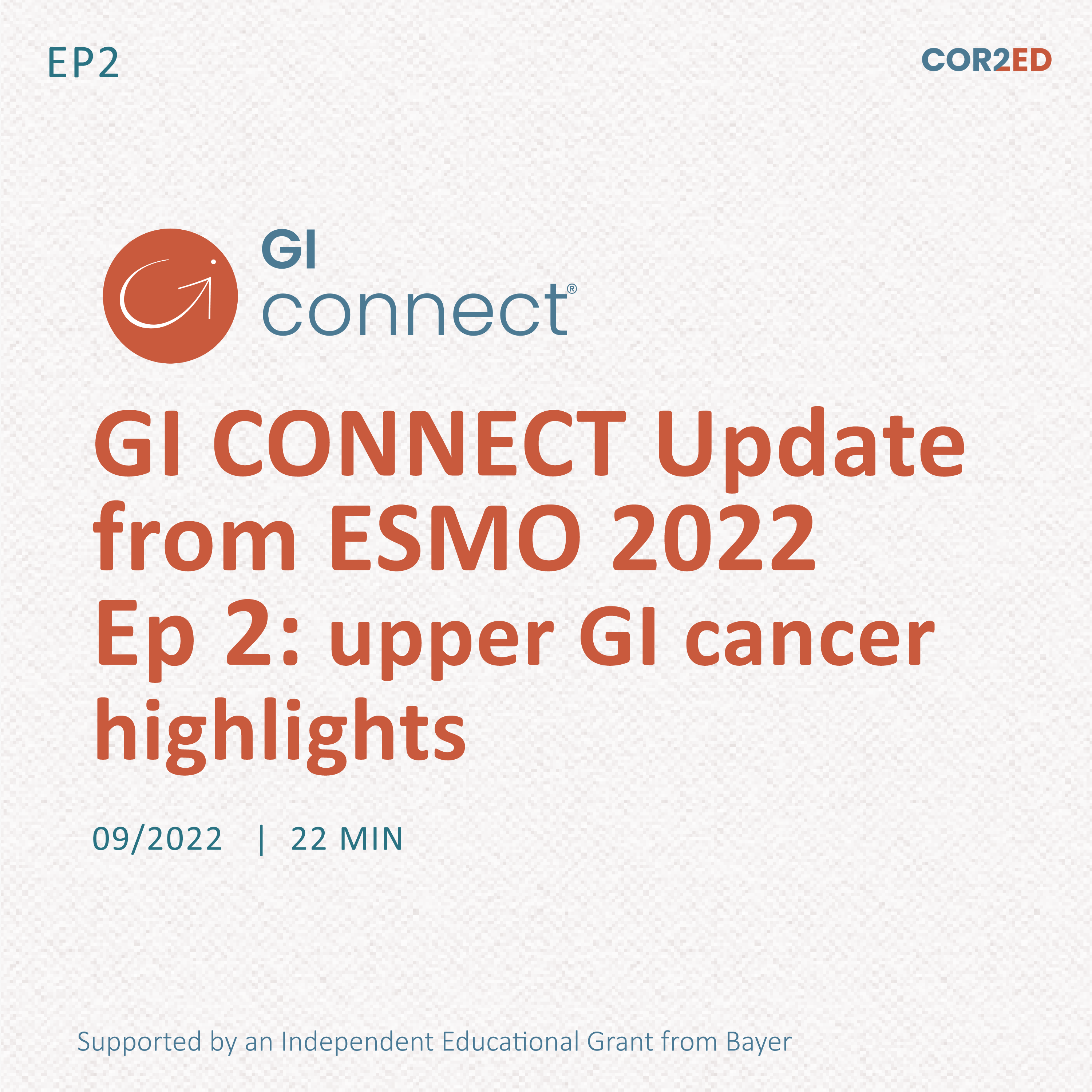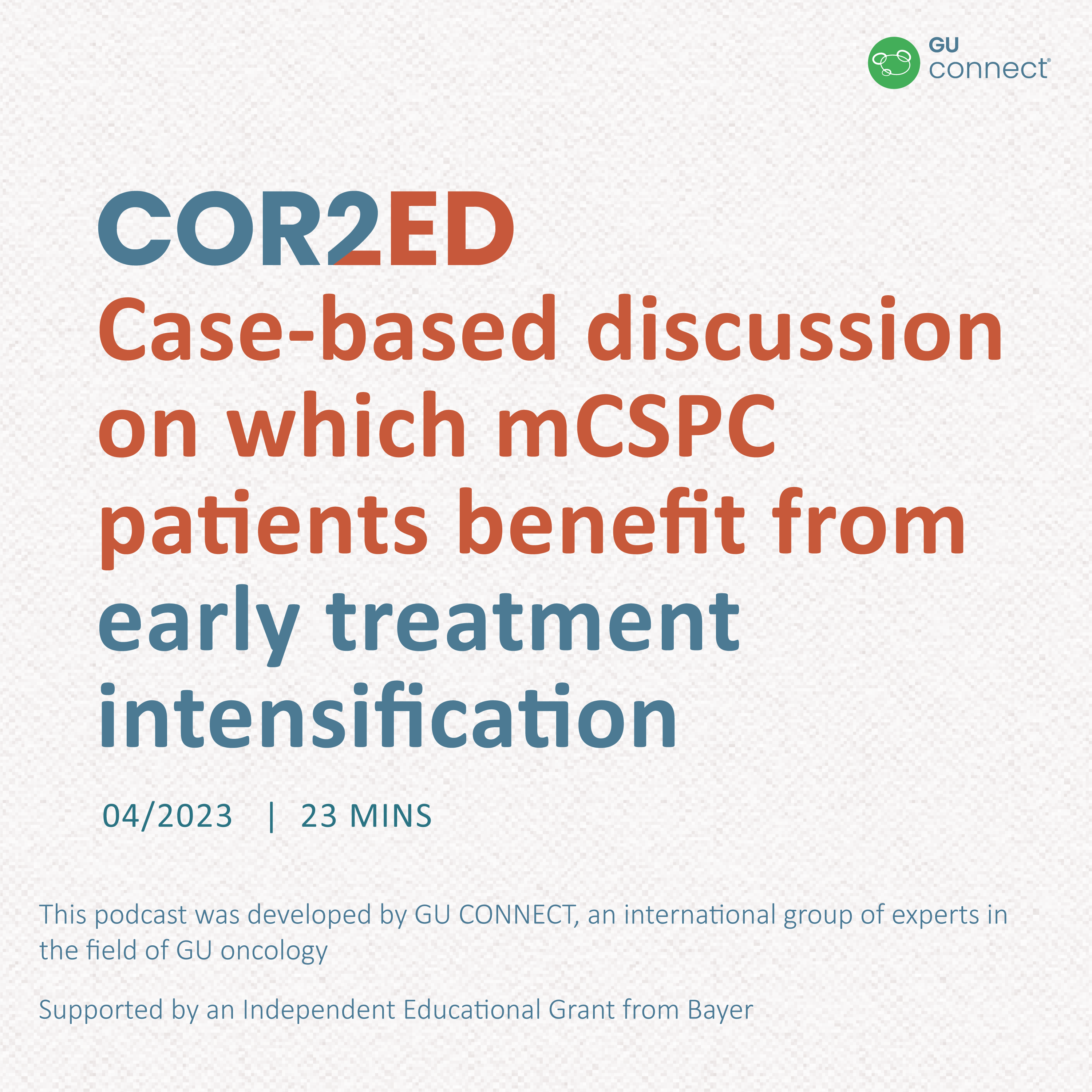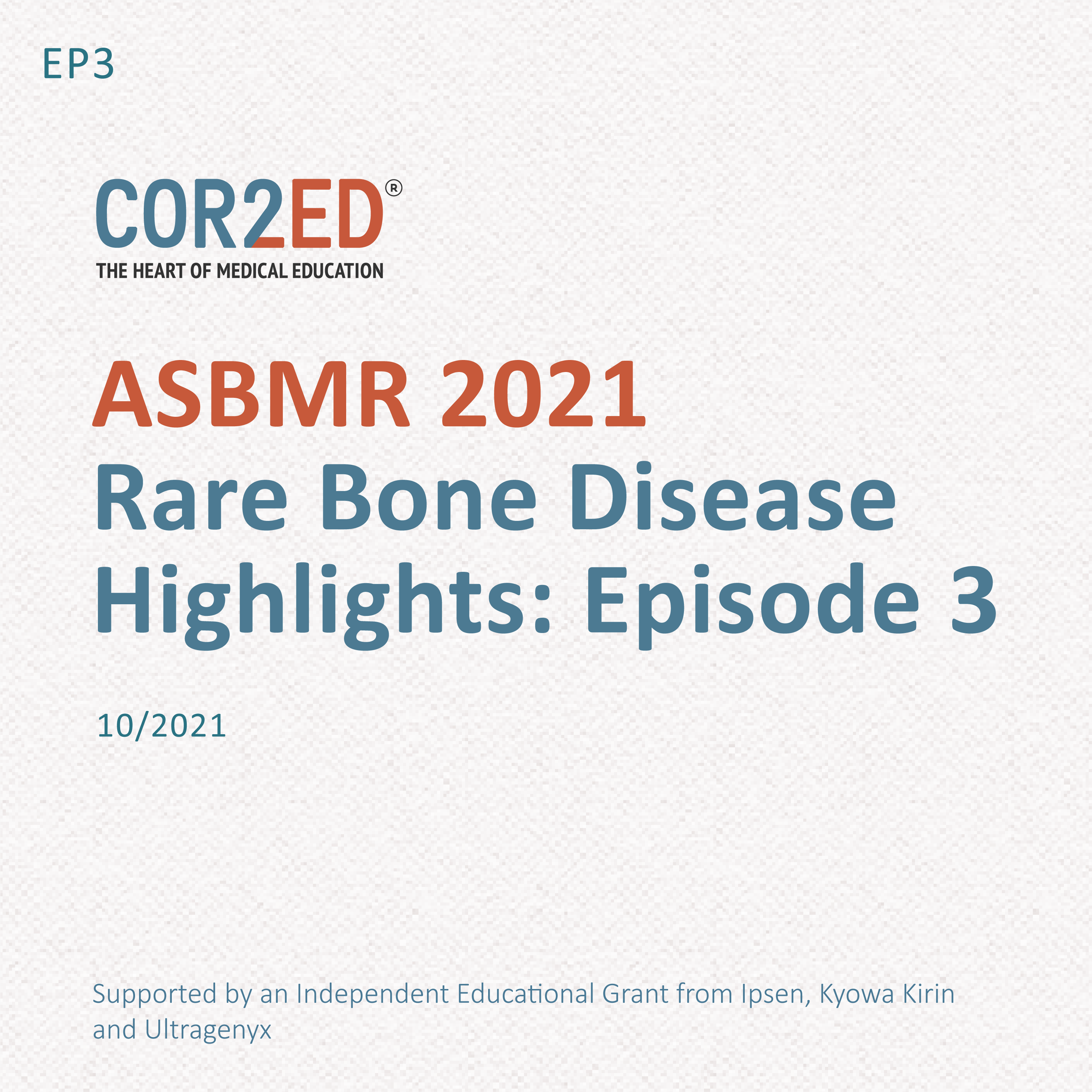Episode Transcript
Sam Klempner
Hello, and welcome to this. GI CONNECT podcast on gastric cancer. My name is Sam Klempner, I'm a GI Medical Oncologist at Massachusetts General Hospital in Boston and I'm joined by my colleague and international gastric cancer leader, Dr Lizzy Smyth.
Elizabeth Smyth
Hi, everybody, thanks for joining us today. I'm Lizzy Smyth. I am a GI Medical Oncologist in Oxford, United Kingdom.
Sam Klempner
So I'm gonna take us through an advanced case. This is a relatively recent case, and hopefully, will illustrate some points in the advanced setting. So, a young woman, 56-year-old, woman presented with fatigue and anaemia, found to have a 4 cm gastric fundus ulcer on endoscopy. Biopsy confirmed this is a moderately differentiated adenocarcinoma. Fit patient, really minimal past medical history. Just some baseline hypertension and glucose intolerance. Patient is anaemic. Family history, really non-contributory here, no GI cancers. No physical exam findings. Patient has diffuse lymphadenopathy above and below the diaphragm on baseline staging scans and 3 liver lesions.
So we have a patient with a de novo advanced gastric cancer. What more do you want to know specifically? What biomarkers do we absolutely need to know? And how are you approaching biomarker testing for the routine patient?
Elizabeth Smyth
So we have the biomarkers that are essential to have, and then we've got those that are nice to have. So for all of my first-line patients, most critical for me is MMR then HER2 then PD-L1 and all of those have an influence on treatment. The reason why I think MMR is the most important is because we cannot miss the opportunity to treat these patients with immune checkpoint inhibitors, either with or without chemotherapy, because they're quite likely to have an excellent response even to monotherapy and to have long term survival with access to immune checkpoint inhibitors. So, MMR is number one, and so I usually prefer to test the IHC. We get the result back in a day or 2 and so we have the information ready before we make a decision on treatment for the patient.
HER2, an oldy but a goody. We've been doing it for about 10 years now, and certainly, in Europe this is retaining eligibility for trastuzumab for HER2-positive patients. We don't yet have access to trastuzumab and pembrolizumab as you do in the States based on the results of KEYNOTE-811, we need to wait for the overall survival data from that trial.
And lastly, PD-L1. So PD-L1, we test for eligibility for immune checkpoint inhibitors in Europe and the UK. Patients are required to have a CPS score of 5 or greater. That's a little unlike the United States and Asia, where patients with any PD-L1 score may be treated, although I gather that you might choose not to treat patients with a CPS score of under 5. Is that right?
Sam Klempner
Yeah. So ASCO recently came out with sort of practice guidance, I guess a little more geared toward US practice patterns, that I think is relatively aligned with EMA-guided approaches. So clearly the greater than 5 population are deriving the greater magnitude of benefit, and if it's greater than 5, yes, clearly the answer is yes. If it's totally negative, as in less than 1 we routinely do not offer checkpoint inhibitors. And in the 1 to 4 group, I think that there's a lot of variability and we could have a whole podcast about what antibody clone you use, what site you test, how you interpret it, what do you do with the 3, is 3 really the same as a 6. So this is really an individual discussion, and I'd say I've certainly used it in patients between, you know, 1 and 4 and it's variable. I try to be consistent.
Just out of curiosity, what tests are you using for PD-L1 at your institution?
Elizabeth Smyth
Interesting. So we are using 223C. I just moved institutions though. So previously, I switched from 223C to 2088, although we have access to both. And the reason why I switched to 2088 is because data last year suggested that 2088 it might pick up a few more patients to be CPS high or checkpoint eligible than 223C. If I'm honest, based on my clinical practice, I haven't seen a whole lot of difference. When that data emerged last year to suggest the 2088 was more sensitive, I signed a bunch of patients back to be re-tested, and I did find one patient who came up as a checkpoint eligible based on that, but that could have been heterogeneity rather than the assay. So, we don't really know. I will say we could talk about this all day, couldn't we? But ultimately, I agree with you. If you'd asked me 2 years ago, I would have been totally only CPS 5 should be treated. But I've seen so much data on the variability of these assays now and inter-pathologist variability. I don't think we can say a CPS 4 is not a CPS 5, I think that's very difficult. So, I think that we're going to need to work on this a little bit more in the next couple of years and understand where those grey areas are. Because I think what we don't want to do is miss out on treating the patients who might be helped by immune checkpoint inhibitors.
I’m just going to plug a trial that I'm doing at the EORTC then, where we're going to take a big cohort of patients and do a kind of blueprint study like was done in lung cancer. Looking at maybe 200 patients’ PD-L1 score using the different assays, and score those with that with a large group of pathologists and understand where the challenges are and how we might move forward. So, ask me again in a year, I might give you a different answer.
Sam Klempner
Definitely will ask you again in the year. Alright, let's make this a little bit more complicated because this might be the real world within the next months, even. So, imagine zolbetuximab is approved. What else are we going to need to know about this patient to potentially guide even another option?
Elizabeth Smyth
Okay, so zolbetuximab is a CLDN18.2 monoclonal antibody. It’s just demonstrated improvements in overall survival in 2 studies, so SPOTLIGHT and GLOW, that used for FOLFOX and CapeOX variably in CLDN18.2 positive tumours. So we're going to need to get working on those CLDN18.2 IHC tests.
So I think the cut-off and the trials was around 70 or 75% of cells being positive. Is that right, Sam?
Sam Klempner
Yes, 75%, the cut-off for GLOW and SPOTLIGHT exactly.
Elizabeth.Smyth
And that captures about 40% of patients, if I’m right. So we're going to have 40% of patients who are CLDN18.2 positive and might benefit from zolbetuximab. We’re going to have 30, 40% of patients who are PD-L1 high, let's call it, that might benefit from immune checkpoint inhibitors. And so the question will be, what's the overlap? Is there one treatment which is better for the patients who are PD-L1 high versus CLDN18.2 high? I don't think we have the answer for that, but I do remember that Kohei Shitara presented a little bit of data on the PD-L1 versus CLDN18.2 didn't he? In GLOW, can you remember that?
Sam Klempner
Yeah, I think it's a little bit tricky. Personally, I almost think this is like a new type of biomarker. This is really like a lineage-specific marker. You're kind of marking tumour cells, not so much defining a biology like HER2 or MSI high. So really interesting for the field, you know, kind of like TROP2 is a like a lineage marker for just tumour cells itself.
In the studies, in the phase 3 trials, there was perhaps a lower than reported CPS high population. And it may have been that we get PD-L1 results quite quickly, and therefore there was sort of a pre-selection against some of those patients. I think, to be determined. But from retrospective data, it almost looks like CLDN positivity and negativity sort of runs through every other biomarker subgroup at equal frequencies. And this sets up a really interesting situation, like you said, you know, we have a very prevalent biomarker at around 40%. 40% of HER2-positive patients are going be CLDN positive. And then what are you going to do? And as you suggested about PD-L1 as well. Certainly, the sort of obvious path forward is do the KEYNOTE-811 strategy and combine the immunotherapy with the monoclonal antibody and chemo. And that's the strategy that is actively being pursued.
Let's make this a case of exactly that scenario. So, let's say you have a CPS 3 and a CLDN18.2 positive patient, and you have all the tools available. Are you going to give the CLDN first in that scenario? And would you be different if it was, let's say, a CPS of greater than 10 where you know it's a very positive patient?
Elizabeth Smyth
Wow! You made that question too easy for me because I can only treat patients with PD-1 inhibitors if their CPS score is 5 or greater. So, if the patient has a CPS score 5 or greater, I think that that is the group that benefits most from immune checkpoint inhibitors. So I would be comfortable treating them with an immune checkpoint inhibitor first. Although I do caveat that with the median overall survival in SPOTLIGHT being better than we saw in any of the immune checkpoint inhibitor trials. But I think there are aspects to that that may not relate directly to zolbetuximab.
So, I think that I would be satisfied if the CPS score was pretty high to go ahead with the immune checkpoint inhibitor. But perhaps if it was lower, so 3 or 1, I think the jury is out. One thing that I would mention is that zolbetuximab is very well tolerated. I know that there are some concerns around nausea but certainly, I treated a bunch of patients on one of those trials, and we found the nausea quite manageable with NK1 antagonists, and we used a lot of olanzapine. And so nausea, I think if you address it early on dissipates fairly quickly. So, it certainly wasn't a challenge for me for patients I treated on the study. I don't know what your direct experience was Sam?
Sam Klempner
Yeah, I agree. I think like any new drug, little bit of a learning curve similar to we had with, you know Tdxd. First few times you give it, you get a sense. But I agree, I think, after a little bit of experience, and playing around with, you know, perhaps interrupting the infusion if the nausea was significant. We can get patients through this, and it's hard to ignore two phase 3 trials with survival benefit when we're picking therapies for our patients. So, I agree, I think this is a manageable toxicity for patients, and otherwise the drug is quite well tolerated.
Let's say, this patient gets FOLFOX and zolbetuximab, and I'm projecting forward maybe 6, 12 months of our clinical practice lives. So, this patient gets FOLFOX and zolbetuximab and ultimately progresses after, let's say, 7-8 months, otherwise still remaining fit. How do you think we're going to think through second-line? And are you going to biopsy and look at CLDN expression again, kind of like we do for HER2 sometimes?
Elizabeth Smyth
You raise a brilliant question. Just going back to what you said earlier, I totally agree that we're in a new era of biomarkers. So CLDN, it's not an oncogene. We're not targeting it. It's a passenger on the gastric cancer cells. So we don't know whether we're going to get loss of the antigen over time. We don't know the mechanisms of resistance. Based on what we learned from HER2, because you look at 10 years of failed HER2 studies in gastric cancer, and what we hadn't done was done a biopsy to see if the HER2 was there. So what we need to do, I think, is explore pretty quickly what the resistance mechanisms will be.
What I would like to see, and what I see coming is with CLDN and with all of these targets is that we should be doing repeat biopsies. I mean breast cancer doctors have been doing this for years, and what is going to benefit patients most is sequential treatment. So especially with CLDN, we've got lots of very exciting drugs. We've got the antibodies, they've got their first, and we're going to use those with chemo, possibly with IO, as you mentioned. But we've also got lovely ADCs, bispecific T cell engagers, and then CAR-Ts, very exciting, very preliminary. But I think the patients are going to do best if we sequence these over the course of their treatment. But first of all, we need to understand if the target is still there. So, I think what we need to do in future is make friends with our endoscopists, with our interventional radiologists and discuss patients, why they benefit from biopsy. So this is going to be something that is going to be what we do in future.
Sam Klempner
Yeah, I'm going to go back and get a IR fellowship so I can just do this!
Elizabeth Smyth
All we need is an ultrasound!
Sam Klempner
Yeah, exactly. I mean, I think you raise an important point that some of these protein markers are not really well suited to liquid tests, and so the biopsy will remain important.
So maybe to close, I think the key themes that you mentioned, and feel free to expand on, are biomarker testing in the advanced setting, teasing apart the overlap which I think is the task of all of us who do research in this field for the coming years, and then sounds like the good news message of more targets coming. Zolbetuximab, we expect some approval. We have bemarituzumab, an FGFR2-directed therapy and many other subsets that will be coming forward in the hopefully near future. I don't know if you have any other messages you want to get across in the advanced setting?
Elizabeth Smyth
Gastroesophageal and gastric cancer have always been difficult cancers to treat, and I think that we're on a kind of event horizon now, where we've seen the availability of these new targets. We've seen really good data. We're starting to see good data for PD-1, we'll see the next generation of immune checkpoint inhibitors coming. CLDN18.2, combining that with PD-1, FGFR2b, next-generation HER2 inhibitors. And then we've got our cellular therapies.
So, you know, lung cancer, 10 years ago the survival was less than a year for most patients, sadly, and now you've got 30% 5 years survival. So, I very much hope that we're heading in that direction. And it's going to be about participating in clinical trials, understanding the biopsies and again, always focusing on the holistic needs of patients. With oesophageal cancer, we can't get away from that, so nutrition and dealing with their symptoms. But I think that the future is looking bright.
Sam Klempner
Yeah, well said and hopefully, this was educational for everybody listening and then I definitely look forward to the next time we meet in person and talk online.
Elizabeth Smyth
Thanks, Sam.


